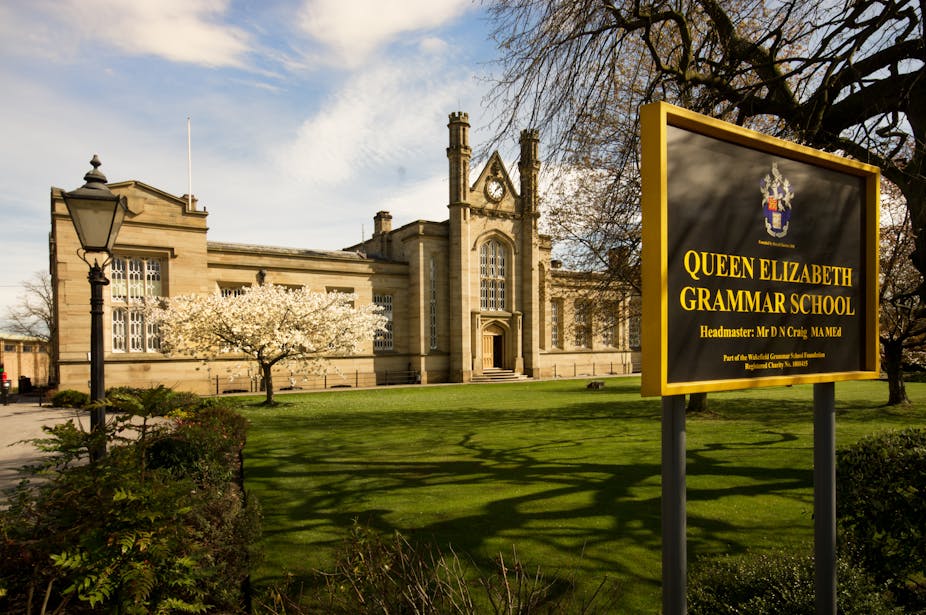The British government is flying kites, but not for holiday amusement. Word has reached the media that Prime Minister Theresa May is poised to “bring back grammar schools” – state secondary schools which choose pupils by selection in a competitive exam.
Right-wing newspapers celebrated the rumour. In their view, the institutions bring the promise of social mobility by giving (as they see it) pupils from families who cannot afford private education the chance of academic schooling. It was this claim to social mobility which led then Labour prime minister Harold Wilson to promise that grammar schools would be closed “over my dead body”.
Labour and the Liberal Democrats instantly took to the barricades in opposition, the former saying that selection was “in the dustbin of history”. Lib Dem leader Tim Farron promised his party will block any attempt to bring back grammar schools.
They object to the assumption that other state schools fail to prepare able students academically; then they point to the pattern of recruitment to grammar schools. Only 3% of pupils receive free school meals (an indicator of social deprivation), compared to 18% across all state schools. The main criticism of grammar schools has always been that most of their pupils – who are often prepared for entrance exam with private tuition – are precisely the kind of middle-class families which could afford private schools.

By 1979, most grammar schools had been turned into comprehensives, sixth-form colleges or (in a small number of cases) gone private. Local authorities led the way in this, with Conservatives as well as Labour councillors “bitten” in Margaret Thatcher’s words “by the comprehensive bug” (she reluctantly presided over the closure of more grammar schools than any other education secretary).
In 1998 Tony Blair drew a line under the matter by legislating to prevent the expansion of remaining grammars while making their closure dependent on local referenda (thereby protecting them better than other schools). Blair did not, therefore, “ban” grammars, as has been claimed.
With only 164 of these schools left, competition for entry has intensified considerably. The King Edward VI schools in Birmingham, for example, have an application ratio of ten to one. The foundation which runs them recently responded to concerns about equal access by reserving a certain number of places for disadvantaged pupils.
Fraught on all sides
So why is May proposing to reopen a potentially incendiary argument about a tiny, somewhat forgotten corner of the education system? The answer, of course, lies in politics. The status of grammar schools is a totemic issue for populist, middle-class Conservatives. Bringing them back would help make amends for Cameron’s position on them. They were horrified when the Old Etonian had the audacity to criticise them in 2007 by saying. They argued that because he didn’t need a meritocracy to prosper he didn’t understand why less fortunate people did.
If May is seeking to bring back grammar schools, she is showing how far she has swum out into clear blue water, metaphorically speaking, distancing herself from the Cameron metropolitan elite’s liberalism and steering back to traditional British values.
The new prime minister made a point of highlighting the unusually high number of state-educated ministers appointed to her cabinet, compared to he predecessor’s. She is now offering a gift to the right. She has united the other parties in opposition to her plan but she seems to think it worth the risk. She has calculated that their position on the matter may deter strategic groups of voters.
However, it is still a big gamble. Politicians remain divided on grammar schools – even within May’s own party. Many Tory MPs enthusiastically joined Cameron in criticising selection nine years ago, and only a handful of his backbench colleagues is needed to stall any change now. It is also interesting that Education Secretary Justine Greening (the first in that post to be educated wholly at a comprehensive school) has been quiet on the matter so far. It is always possible that the enthusiasm of the Daily Mail is stronger for this policy in the silly season than the determination of the prime minister will be to actually push it through when parliament reassembles in September.
Nor do we really know what the public thinks of bringing back grammar schools. They sometimes tell pollsters that they would like more selection, but they often object when their child is not selected.
The difficult matter of selection may drag May into a debate she does not anticipate or enjoy. And she will probably let it go. However, the longer is spent arguing over grammar schools, the less time is spent supporting the remaining 97% of the school system.
Many non-selective state schools perform as well as grammar schools these days. Selection declined over a generation because of a consensus between parties and educationalists, not overnight by dictat. The number of grammar schools is a drop in the ocean of the school system: even trebling their intake would not give them one in ten pupils. Undoing the work of comprehensive reform would be a vastly expensive and politically debilitating project which no prime minister, let alone one negotiating Brexit, would contemplate.

